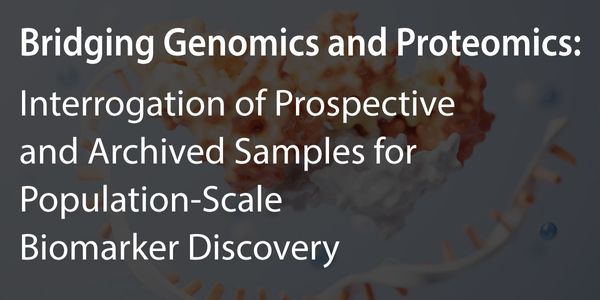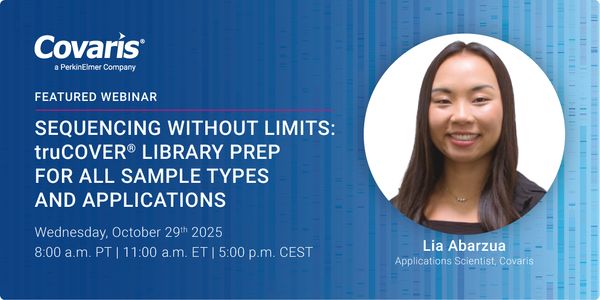PCR
PCR: Polymerase chain reaction, or PCR, is a laboratory technique used to make multiple copies of a segment of DNA. PCR is very precise and can be used to amplify, or copy, a specific DNA target from a mixture of DNA molecules.
-
JAN 15, 2026 | 8:00 AMPersonalized medicine promises to significantly improve patient outcomes, but achieving this requires a deep understanding of human health and disease mechanisms at the molecular level. The...DEC 16, 2025 | 8:00 AMCurrently, the process for microbial identification research in many laboratories involves a combination of culture, PCR, and either send-out or in-house sequencing-based testing – oft...NOV 20, 2025 9:00 AM PT/12:00 PM ET/6:00 PM CETC.E. CREDITSJoin us for an engaging dPCR Academy session designed to help you confidently navigate between digital PCR (dPCR) and quantitative PCR (qPCR). While both technologies are powerful tools for...OCT 29, 2025 | 8:00 AMIn today’s rapidly evolving landscape of next-generation sequencing (NGS), researchers face mounting pressure to deliver high-quality data from increasingly diverse and challenging sam...Join us to explore recent advancements and applications of isothermal amplification techniques, such as LAMP, RCA, and RPA. We will compare these methods with traditional PCR, discuss their...Speaker: Nina Pollak, PhD, DipBus, AFHEA
In this webinar, we will cover time-saving tips to help increase your PCR productivity. We will address common PCR pitfalls that can be avoided with innovations in enzymes, instruments, and...
Speaker:
Marija Navickaitė
, Kyle Hondorp
Presented at: Cancer Research & Oncology Virtual Event Series 2025
Sponsored By: Thermo Fisher Scientific
Sponsored By: Thermo Fisher Scientific
Wastewater serves as a mirror of society, offering valuable insights into a wide range of parameters. Molecular biology leverages this potential by regular analysis of wastewater samples to...
Speaker:
Gabriela Eder, MSc
Infertility affects one in six couples, with fertility treatments facing daunting 2:1 odds of failure versus success. Emerging research highlights the critical role of vaginal microbiome hea...
Speaker:
Dr. Arne Materna
JUN 25, 2025 | 8:00 AM
Traumatic brain injury, together with adjacent brain conditions such as Alzheimer’s disease, is a global health crisis. In this presentation, Aleksandra Hemm, Product Manager from Ther...
APR 24, 2025 | 1:00 AM
C.E. CREDITS
Isothermal amplification methods streamline nucleic acid amplification without the need for thermal cycling. Join us to explore two innovative techniques, Recombinase Polymerase Amplificatio...
MAR 27, 2025 | 9:00 AM
Trees get diseases too! For the molecular research scientists that identify and provide management recommendations for plant diseases that impact trees and other woody plants, tools specific...
JAN 30, 2025 | 8:00 AM
Early detection is critical in combating invasive fungal and mold infections, where every moment counts. Traditional culture-based methods often fall short, with lengthy turnaround times and...
Speaker:
Jose Alexander, MD, ABMM, ABAIM, FCCM, CIC, ASCP, BCMAS
, Nicholas Sanford, PhD
Sponsored By: MicroGenDX
Join us to explore recent advancements and applications of isothermal amplification techniques, such as LAMP, RCA, and RPA. We will compare these methods with traditional PCR, discuss their...
Speaker:
Nina Pollak, PhD, DipBus, AFHEA
Presented at: Clinical Diagnostics & Research Virtual Event Series 2024
Sponsored By: Thermo Fisher Scientific
Sponsored By: Thermo Fisher Scientific
On Demand
C.E. CREDITS
Originally developed for gene editing, CRISPR-Cas systems have now become powerful molecular diagnostic tools. However, their widespread adoption in diagnostics has relied heavily on traditi...
On Demand
C.E. CREDITS
Gene therapy has experienced an increasing number of successful human clinical trials, leading to 6 FDA approved products using delivery vectors based on adeno-associated viruses (AAV). Thes...
Accurate prediction of CYP2D6 activity from genotype data is of utmost importance as CYP2D6 pharmacogenetic (PGx) testing is increasingly used to guide drug therapy. However, given the compl...
Accurate prediction of CYP2D6 activity from genotype data is of utmost importance as CYP2D6 pharmacogenetic (PGx) testing is increasingly used to guide drug therapy. However, given the compl...
Accurate prediction of CYP2D6 activity from genotype data is of utmost importance as CYP2D6 pharmacogenetic (PGx) testing is increasingly used to guide drug therapy. However, given the compl...




















